DVDs, Books, and other Materials about Child Development and Children with Disabilities |
Home Page Curriculum Vitae Products by Topics FAQs Free Downloads Resource Links Order Info Contact Us |
FEEDING VIDEOS
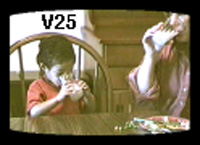 A Sensorimotor Approach to Feeding Problems and Failure to
Thrive (2000)
A Sensorimotor Approach to Feeding Problems and Failure to
Thrive (2000)
55 minutes. V25P: $95
CLICK ON THIS THUMBNAIL
IMAGE TO VIEW A FULL SIZE VIDEO CAPTURE. This video demonstrates the
integration of sensorimotor treatment into a home-based feeding program
for a toddler with diagnoses of Fetal Alcohol Syndrome and Failure to
Thrive. The process of task analysis and problem-solving led to
facilitation of appropriate positioning, utensils, foods, and movement
patterns which resulted in decreased oral sensitivity, a greater variety
of solid foods, and independence in all self-feeding skills.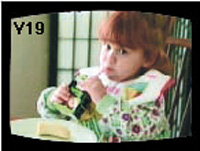
Development of Self-Feeding in the Normal Child
(1995)
30 minutes. V19P: $90
CLICK ON THIS THUMBNAIL IMAGE TO
VIEW A FULL SIZE VIDEO CAPTURE. This video presents the prerequisites
for self-feeding during the first year of life, and developmental
sequences of independent feeding behaviors during the second year,
emphasizing the transition from finger feeding to utensil use. Major
topics include drinking (from bottle to cup to straw), finger feeding,
spoon and fork use, and mealtime social skills.
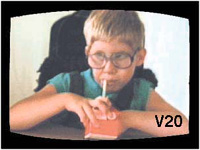 Self-Feeding in the Child with Special Needs
(1995)
Self-Feeding in the Child with Special Needs
(1995)
55 minutes. V20P: $95
CLICK ON THIS THUMBNAIL IMAGE TO
VIEW A FULL SIZE VIDEO CAPTURE. This video demonstrates procedures for
informal observational evaluation of self-feeding in a school-aged child
with cerebral palsy and developmental delays, emphasizing the transition
from finger feeding to utensil use. Task analysis, discussion, and
problem-solving by parents, child, and therapist are interwoven with
recommendations for intervention and demonstration of techniques to
facilitate more appropriate positioning and movements patterns.
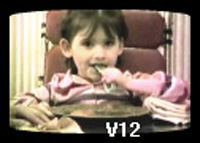 Developmental
Prehension Components of Independent Feeding: From Assessment to
Treatment to Function (1985)
Developmental
Prehension Components of Independent Feeding: From Assessment to
Treatment to Function (1985)
30 minutes. V12P: $90
This video
illustrates how the Erhardt Developmental Prehension Assessment (EDPA)
is used to determine missing components of hand skills needed for
functional activities such as feeding; the relationship of fine motor,
gross motor, oral-motor, visual, and cognitive development; and methods
of integrating treatment into a home program. A school-aged child with
cerebral palsy begins independent feeding as all family members become
involved.
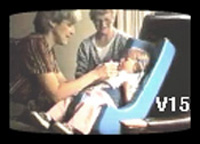 The Consultant's Role in Evaluation and Treatment of
Developmental Eating Dysfunction (1986)
The Consultant's Role in Evaluation and Treatment of
Developmental Eating Dysfunction (1986)
30 minutes. V15P:
$90
This video illustrates the therapist's role as consultant to
families with children who have eating problems. A preschool child with
cerebral palsy is observed being fed by her mother, as a developmental
approach is used to analyze positioning, feeding methods, oral reflexes,
and developmental behaviors. Techniques to facilitate more appropriate
feeding methods and positive interaction are then discussed and
demonstrated by the therapist.